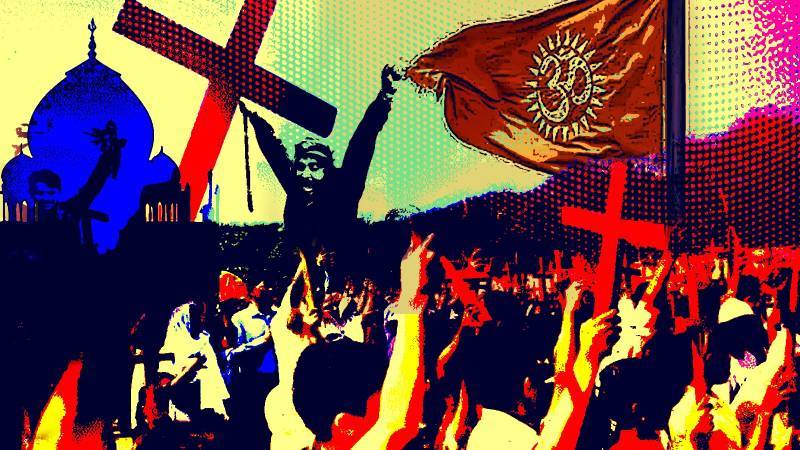
Government departments have either been complicit, largely ignored, failed to protect innocents or failed to prosecute incidents of religious discrimination and targetting in Pakistan in 2023 as a whopping 329 people were accused of blasphemy during the year of which several were lynched.
This was contained in the annual International Religious Freedom report by the United States Department of State issued this week.
The report, which reviews the state of religious freedoms worldwide, said that police in Pakistan at times killed or physically abused members of religious minorities or failed to protect individuals from violence linked to religion.
It added that police were frequently accused of abuses, but it was either lightly sanctioned or not punished at all. When in one case, they detained a blasphemy accused in Nankana Sahib, but the police failed to prevent a mob from storming the police station and lynching the accused. Two officers were suspended pending an inquiry, which eventually exonerated them of "negligence, incompetence and cowardice" charges.
The report, while citing data compiled by the non-governmental organisation Centre for Social Justice (CSJ), it noted that of the 329 people accused of blasphemy in 2023. This was up from 171 people accused of blasphemy in 2022. In 2023, around 75% of the people accused were Muslims, 20% were Ahmadis, and 3.3% were Christians. At least one Hindu was also accused.
Further, it noted that the Federal Investigation Agency (FIA) arrested 140 individuals for alleged blasphemy on social media. Moreover, the Pakistan Telecommunication Authority (PTA) degraded services of the global information repository, Wikipedia, apart from blocking more than 71,000 URLs on social media for containing "objectional" content. Moreover, the Senate passed a law in August that increased punishments for blasphemy in some cases - the bill, however, was sent back to Parliament by then-President Arif Alvi. At least 11 people were handed death sentences by courts, two of which were confirmed by higher courts.
NGOs and civil society activists said that some judges were hesitant to decide blasphemy cases for fear of violent retribution from extremists if they did not impose harsh sentences. Some reports claimed that courts failed to adhere to basic evidentiary standards in blasphemy cases.
CSJ claimed that there were at least 103 cases of forced marriage and the conversion of Christian, Hindu and Sikh women and girls during the year. It prompted a UN panel of experts in January to express it was "deeply troubled" by reports of a rise in abductions, forced marriages, and forced conversions of underaged girls.
According to Ahmadiyya community leaders, authorities continued to target and harass Ahmadis for blasphemy, violations of "anti-Ahmadi laws," and other crimes and regularly denied construction permits for their places of worship. Human rights advocates and Ahmadiyya community leaders reported police and local authorities rarely took action to prevent attacks on or to punish assailants who vandalised or destroyed Ahmadi places of worship, minarets, and gravestones.
Ahmadis continued to report widespread societal harassment and discrimination against community members, including physical attacks, destruction of homes and personal property, and threats intended to force them to abandon their jobs or towns. Ahmadiyya community representatives stated that the Urdu language press frequently printed hate speech, and inflammatory anti-Ahmadi rhetoric continued to exist on social media, at times spread by senior members of mainstream political parties. Community members stated clerics routinely delivered anti-Ahmadi sermons in mosques.
Christian activists continued to report widespread discrimination against Christians in private employment other than menial labour. The report mentioned the August 16 attacks in Jaranwala, Faisalabad when a large mob, that sources stated was allegedly incited by local Tehreek-e-Labbaik Pakistan (TLP) leaders, destroyed churches, several homes of Christian families, and a cemetery in Jaranwala in response to a blasphemy allegation. Police arrested five Christians on blasphemy allegations and more than 350 protestors for the violence, including some TLP leaders.
Further, it said that government officials and politicians attended and spoke at Khatm-e-Nabuwat (Finality of Prophethood) conferences that secular and Ahmadi critics argued were venues for hate speech against Ahmadis.
Civil society groups continued to report that some religious seminaries around the country taught doctrines they considered to promote violent extremism and intolerance toward religious minorities.
Civil society organisations and media documented at least 16 murders where people were killed for their faith during the year; this included seven Shia Muslims, four Sikhs, three Christians, one Hindu, and one Ahmadi.
The report noted that activists and members of minority communities said the country's culture of impunity, along with state inaction, fueled hate crimes and blasphemy accusations.
Human rights and religious freedom activists and members of minority religious groups continued to report that they exercised caution when speaking in favour of religious tolerance because of a societal climate of intolerance and fear. Some activists reported receiving death threats because of their work.
The report said that US Ambassador Donald Blome, other US embassy officers, and visiting senior US officials, including the Ambassador at Large for International Religious Freedom, engaged with government officials to urge them to make progress on blasphemy laws and laws concerning Ahmadi, better protect members of religious minority communities, improve sectarian relations, and encourage interfaith respect.
It reiterated that On December 29, the US Secretary of State had redesignated Pakistan as a "Country of Particular Concern" (CPC) under the International Religious Freedom Act of 1998, as amended, for having engaged in or tolerated particularly severe violations of religious freedom and announced a waiver of the sanctions that accompany designation in the national interest of the United States.

